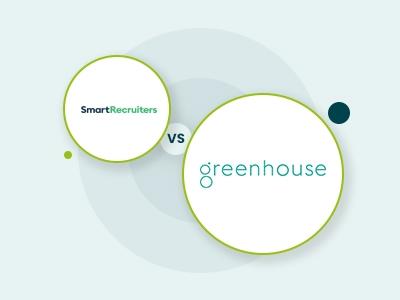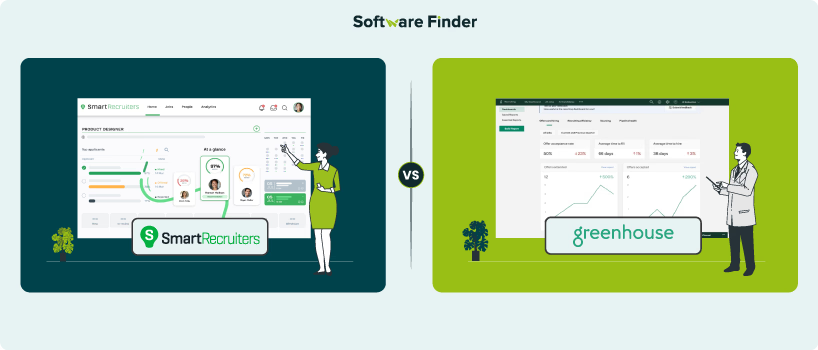
Hiring the right people is getting harder—not because there aren’t enough candidates, but because managing the recruitment process has become increasingly complex. From inconsistent candidate experiences to inefficient collaboration between hiring teams, the gaps in traditional hiring methods are hard to ignore.
SmartRecruiters and Greenhouse are two leading recruitment platforms that address this problem, helping organizations modernize their approach to attracting, evaluating, and hiring talent. While both offer AI-powered tools, customizable workflows, and enterprise-grade features, they differ in their approach to automation, team collaboration, and scalability.
In this SmartRecruiters vs Greenhouse article, we’ll compare their benefits, features, and integrations. By the end, you’ll have enough information to help you decide which solution is the right fit for your hiring strategy.
Features | SmartRecruiters | Greenhouse |
Applicant Tracking System | Offers a modern, AI-enhanced applicant tracking system built into its SmartOS platform | Designed around a structured hiring methodology |
AI Capabilities | Provides an AI called Winston Intelligence with four distinct modules | Embeds AI across its recruiting workflows to reduce busywork |
Reporting And Analytics | Provides a powerful analytics suite called SmartAnalytics | Offers a set of reporting tools such as 40 pre-built reports |
Customer Relationship Management | Offers a fully integrated, AI-powered CRM called SmartCRM | Provides a dedicated CRM module |
Pricing | Starts at $14,995 | Custom pricing |
SmartRecruiters is an enterprise-grade talent acquisition platform that combines a powerful applicant tracking system (ATS) with recruitment marketing and collaborative hiring tools. It’s designed to manage the entire recruitment journey, from job creation and candidate sourcing to hiring and onboarding.
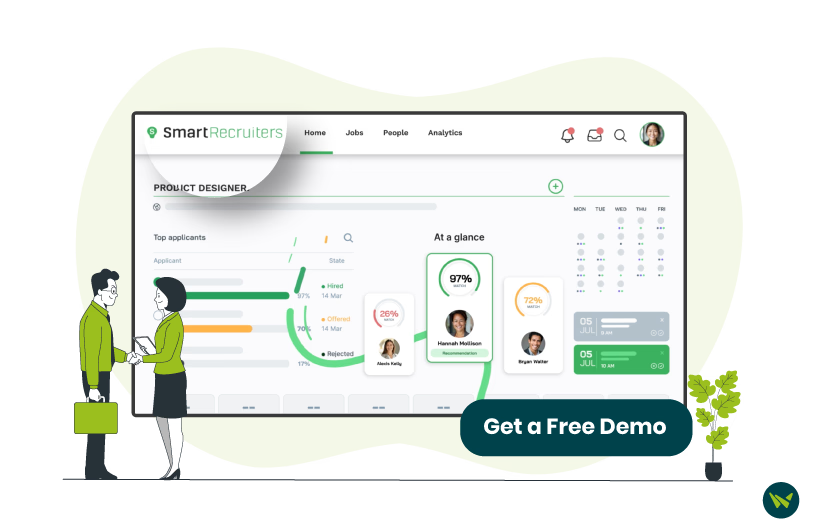
On top of all this is its AI suite, known as ‘Winston Intelligence,’ which offers tools like Winston Chat, Match, Screen, and Companion. These leverage large language models to automate repetitive tasks, such as resume screening, candidate engagement, and hiring manager nudges, allowing teams to focus on more strategic efforts.
As such, SmartRecruiters is best suited for mid-sized to large enterprises across various industries, including retail, manufacturing, and professional services. Its integration capabilities with platforms like Slack, Microsoft Teams, and LinkedIn, along with advanced analytics powered by Visier, make it a compelling solution for organizations that prioritize data-driven hiring.
Unique SmartRecruiters Features
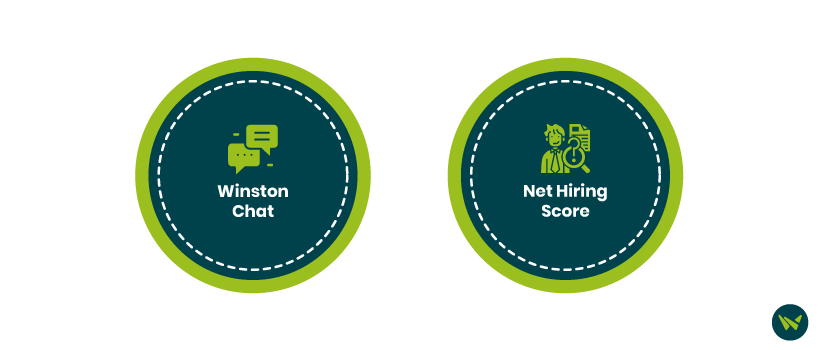
- Winston Chat: A cutting-edge, LLM-powered conversational assistant that engages with candidates, dynamically answering questions, recommending job matches, conducting screenings, and scheduling interviews
- Net Hiring Score: SmartRecruiters features an in‑product ‘Net Hiring Score’ metric—a customized NPS style survey designed to measure recruiter and manager satisfaction with hire quality post-90-day ramp up
SmartRecruiters Pros And Cons
Pros
- Flexible configuration options, allowing users to tailor their workflows according to their needs
- Insightful analytics that promote data-driven decision making
- User friendly layout, making it easy to post and manage job postings
Cons
- Scorecards take time to set up
- Occasional slowdowns due to server issues
Greenhouse software is an AI-enhanced, end-to-end hiring platform built around a structured applicant tracking system. An industry leader for more than 10 years, it empowers human resource (HR) teams with tools that streamline every stage of recruitment, all within a scalable, easy-to-use platform.
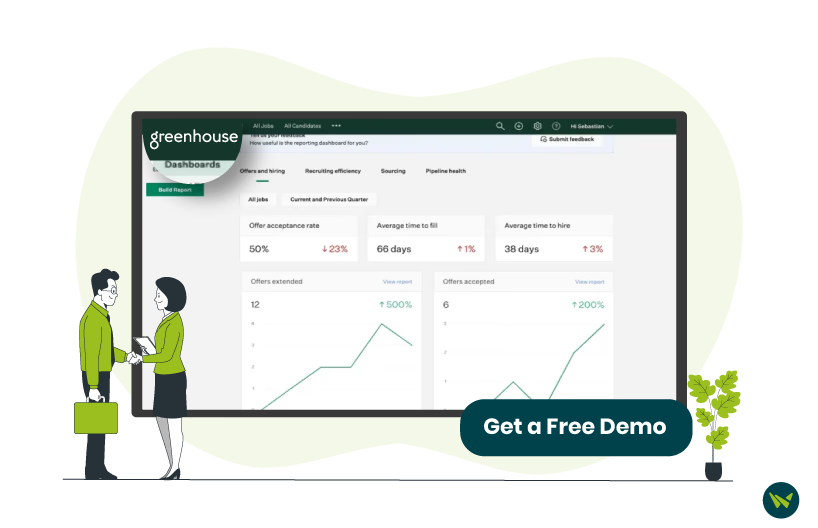
The platform is best known for its structured hiring approach, enabling teams to develop interview kits with predetermined questions and standardized scorecards. This ensures consistency in candidate evaluation, reduces bias, and enhances collaboration among hiring teams. Greenhouse also embeds AI features directly into its workflow, automating tasks such as drafting job descriptions, personalizing sourcing outreach, and summarizing candidate data.
Serving businesses ranging from early-stage startups to global enterprises, Greenhouse supports scalable workflows, a branded candidate portal, and compliance features. Its CRM capabilities also allow organizations to build and nurture talent pipelines in advance of hiring needs. Finally, Greenhouse integrates flawlessly into many existing systems, offering over 500 pre-built integrations, including tools like LinkedIn RSC and common HRIS systems.
Unique Greenhouse Features
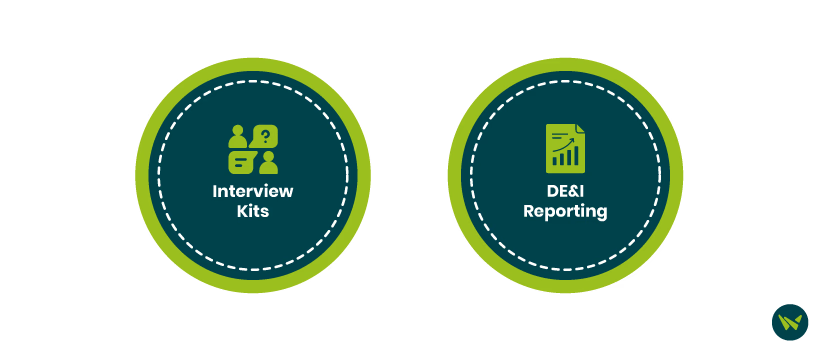
- Interview Kits: Greenhouse enables teams to create detailed interview kits with tailored interview questions and configurable scorecards
- DE&I Reporting: Greenhouse includes specialized DE&I reporting with demographic-specific questions that help identify potential bias leakage points in hiring funnels
Greenhouse Pros And Cons
Pros
- Allows users to schedule across multiple calendars at the same time
- High level of customization, especially in pipelines, scorecards, and notifications
- Offers a pipeline view, giving complete visibility into the hiring process
Cons
- Mobile app lacks complete functionality
- Greenhouse’s API has certain limitations, which can create discrepancies between data sets
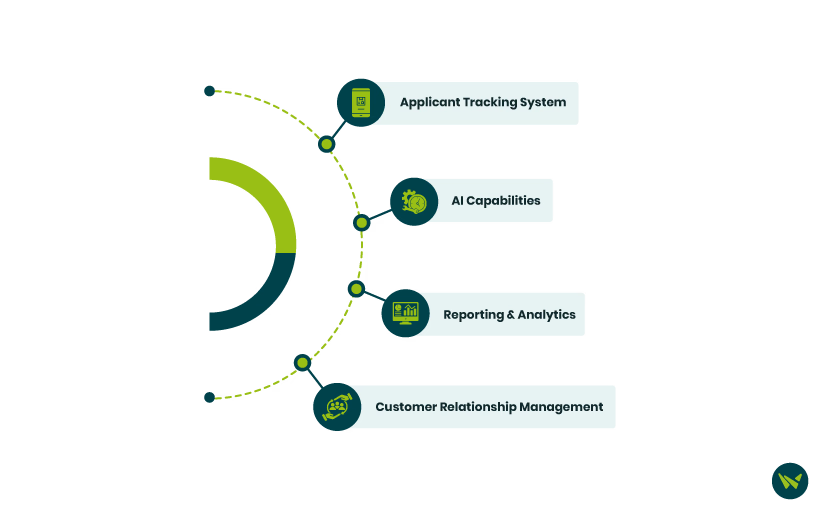

SmartRecruiters offers four pricing tiers, each offering an increasing number of features per tier:
- Essential - $14,995
- Professional - Customized pricing
- High Volume - Customized pricing
- Complete - Customized pricing
Disclaimer: The pricing is subject to change.
On the other hand, Greenhouse offers three pricing tiers, each at a custom price. However, like SmartRecruiters, their pricing tiers scale alongside the number of features provided. These pricing tiers are:
- Essential - Customized pricing
- Advanced - Customized pricing
- Expert - Customized pricing
Disclaimer: The pricing is subject to change.
When it comes to choosing the right recruitment software, Greenhouse stands out for its extensive feature set and structured hiring practices. With tools like customizable interview kits, DE&I-driven analytics, and co-pilot-style AI recruiting tools, it proves to be a strong option for companies prioritizing candidate experience and data-driven decision-making.
With that said, SmartRecruiters is still a great AI recruiting software for large organizations seeking efficiency, scalability, and visibility across global hiring operations. Its primary strengths lie in its AI-first approach (Winston Intelligence), unified CRM-ATS platform (SmartOS), and flexible workflow management.
As such, selecting between SmartRecruiters and Greenhouse depends on your organization’s hiring style, team structure, and strategic goals. Whether you need automation at scale or a more deliberate, structured recruitment process, both platforms offer the capabilities to help your team hire better and faster.
However, if neither software is suited to your current requirements, try looking into alternate HR software such as Zoho Recruit and ADP Workforce Now.
